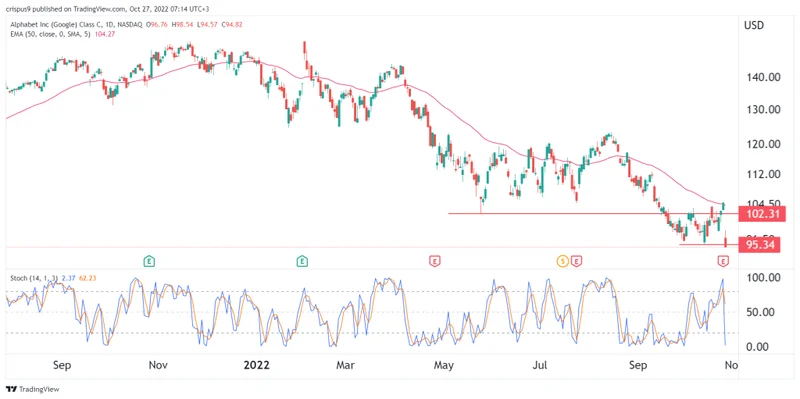Alphabet's Stock Rally: A Reality Check on Earnings and Big Tech Valuations
It’s a familiar dance on Wall Street. A few days before a major earnings report, a prominent analyst issues a conveniently timed upgrade, setting a narrative that ripples through the market. So it was on October 27th, when JPMorgan Chase reiterated its "buy" rating on Alphabet and hiked its price target to $300. The market, predictably, listened. The `google stock price` ticked up 3.6% before the closing bell.
The reasoning provided was a checklist of modern tech optimism: the perceived removal of an antitrust overhang, and the promise of Artificial Intelligence boosting both YouTube advertising and, most critically, Google Cloud growth. This was the story investors were told to watch. The stage was set for a referendum on Alphabet’s future as an AI juggernaut.
But when the numbers actually dropped on Wednesday, the story wasn't quite so complex. The headline wasn't a subtle inflection in cloud market share or a forward-looking projection on AI monetization. It was blunt force. Alphabet reported earnings per share of $2.87, annihilating the consensus estimate of $2.29. That isn’t just a beat; it’s a statistical outlier. The company earned over 25% more profit per share than the aggregate of Wall Street analysts expected—to be more exact, 25.3% more. The stock popped again, this time by 2.7%. The narrative was about the future, but the reaction was about the present.
The Narrative vs. The Numbers
In the lead-up to any Big Tech earnings, there’s an almost desperate search for a compelling storyline. For `google alphabet stock`, that story has been its costly and protracted battle to catch up to Amazon’s AWS and Microsoft’s Azure in the cloud computing wars. The recent explosion in AI has only intensified this focus, with investors scrutinizing every mention of Google's in-house TPU chips as a potential challenger to Nvidia's GPU dominance. The pre-earnings chatter was all about whether `alphabet earnings` could prove its AI bona fides and show momentum in its Cloud segment.
This is where I find the market’s focus genuinely puzzling. While Google Cloud is undeniably a critical component of the company's long-term strategy, the sheer scale of the earnings beat points to a much simpler, less speculative truth. The core business—Search and YouTube advertising—is a cash-generation machine operating at a scale that almost defies comprehension. The company’s net margin was reported at 31.12%. Let that sink in. For every dollar in revenue, nearly a third is pure profit.

The market wanted to talk about AI tailwinds and cloud infrastructure, but the numbers screamed about the fundamental, almost boring, reality of the existing advertising duopoly. It’s like analyzing the aerodynamics of a freight train's spoiler while ignoring the colossal diesel engine pulling thousands of tons of weight behind it. Did AI contribute to the efficiency of that engine? Almost certainly. But the engine itself is the story. The massive EPS surprise wasn't a forward-looking indicator of AI success; it was a backward-looking testament to the raw, unassailable power of its primary business. So why does the narrative-chasing persist when the data is so clear?
A Healthy Dose of Skepticism
While Google investors have big expectations after stock’s sharpest quarterly rally in 20 years, it's worth noting the quieter signals in the data. Over the last quarter, corporate insiders sold 246,150 shares of company stock. The Chief Accounting Officer, for instance, sold over 16% of her position in a single transaction on October 15th (a sale valued at just under $700,000). These are not panic-inducing numbers for a company with a market cap north of $3 trillion, but they provide a necessary counterpoint to the unadulterated bullishness. Insider selling isn't always a red flag, but it’s a data point that suggests those with the most intimate knowledge of the company’s operations are trimming their positions at these valuations.
This brings us back to the Cloud question. Investors are desperate for any clue that Google’s blockbuster deal with Anthropic and the deployment of its TPUs are starting to meaningfully challenge the competition, particularly the `nvidia stock price` that has dominated the AI hardware market. Management will surely be pressed on capital spending for data centers in the coming quarters, as this is the most tangible metric of their commitment to the AI arms race.
But the details on how much of the current Cloud growth is directly attributable to new, high-margin AI workloads versus legacy services remain opaque. We know Cloud is growing, but is it growing profitably and at a rate that justifies it being the central focus of the entire investment thesis? Or is it a capital-intensive battle for market share where the true return on investment is still years away? The earnings report gave us a definitive answer on profit, but only a speculative breadcrumb trail on the AI narrative.
The Engine Is Still the Engine
At the end of the day, the market got what it wanted, just not for the reasons it was told to expect it. The pre-earnings hype was a story about transformation and the future of AI. The result was a story about dominance and the profitability of the present. Wall Street’s obsession with finding the "next big thing" inside Alphabet—be it Cloud, Waymo, or some other moonshot—often obscures the almost unbelievable financial power of its core advertising business. The AI story is exciting, and it may well define the company's next decade. But this quarter's stock surge wasn't fueled by a narrative. It was fueled by cash. And in this market, that’s the one data point that never gets old.
